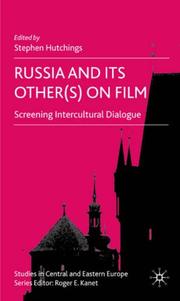| Listing 1 - 3 of 3 |
Sort by
|
Book
ISBN: 9780275994624 0275994627 Year: 2008 Publisher: Westport, Conn. : Praeger,
Abstract | Keywords | Export | Availability | Bookmark
 Loading...
Loading...Choose an application
- Reference Manager
- EndNote
- RefWorks (Direct export to RefWorks)
Since the assassination of John F. Kennedy, motion pictures and television productions-some based on historical fact and conjecture, others clearly fanciful-have embraced the idea that conspiracies shape many events, hide others, and generally dictate much of the course of modern life, often to the disadvantage of the average person. As a result, conspiracy theories have developed into a potent undercurrent in American politics. By the 1990s, it was not unusual to find conspiracies used as explanations for a wide range of political events that would otherwise seem to have quite ordinary explanations. Thus, a vast right-wing conspiracy was suggested as the source of Bill Clinton's troubles, just as conspiracy-like machinations of the liberal media were used to explain why the picture of world events did not coincide with conservative views. And this is to say nothing of the bitter arguments that still erupt over varying explanations for the attacks of 9/11. Regardless of a person's opinion about such claims, what these and many other examples clearly show is that conspiracy-theory explanations have penetrated mainstream American thought. Here, author Gordon Arnold examines the evolution of this cultural climate in the United States. Conspiracy Theory in Film, Television, and Politics examines the intersection of various film and television productions in the context of unfolding political developments. The chapters follow this story chronologically, showing how screen media have both reflected and shaped the cultural milieu in which traumatic events and political controversies have been interpreted with increasing cynicism. The work also reviews the original contexts in which film, television, and political manifestations of conspiracy ideas first appeared.
Conspiracies --- Motion pictures and television --- Popular culture --- Political culture --- Conspiration --- Cinéma et télévision --- Culture populaire --- Culture politique
Book
ISBN: 9782296065413 Year: 2008 Publisher: Paris : L'Harmattan,
Abstract | Keywords | Export | Availability | Bookmark
 Loading...
Loading...Choose an application
- Reference Manager
- EndNote
- RefWorks (Direct export to RefWorks)
Selon les auteurs, les majors américaines dominent désormais le marché mondial du cinéma et il est difficile de conserver en France un système spécifique de financement. Ils examinent les relations établies entre Canal + et les professionnels du cinéma français dans le cadre de la mondialisation des industries de la culture et les menaces qui pèsent sur l'exception culturelle française.
Motion picture industry --- Motion pictures --- Motion pictures and television --- Americanization --- Audio-visual materials --- Culture and globalization --- Cinéma --- Cinéma et télévision --- Américanisation --- Audiovisuel --- Culture et mondialisation --- Economic aspects --- Industrie --- Aspect économique --- Canal + --- Cinéma --- Cinéma et télévision --- Américanisation --- Aspect économique --- Industrie cinématographique --- Exception culturelle --- États-Unis --- Hollywood (Calif.) --- France

ISBN: 0230517366 9780230517363 1349355097 9786611975982 1281975982 0230582788 9780230582781 9781349355099 Year: 2008 Publisher: London : Palgrave Macmillan
Abstract | Keywords | Export | Availability | Bookmark
 Loading...
Loading...Choose an application
- Reference Manager
- EndNote
- RefWorks (Direct export to RefWorks)
Russia's interactions with the West have been a perennial theme of Slavic Studies, and of Russian culture and politics. Likewise, representations of Russia have shaped the identities of many western cultures. No longer providing the 'Evil Empire' of 20th American popular consciousness, images of Russia have more recently bifurcated along two streams: that of the impoverished refugee and that of the sinister mafia gang. Focusing on film as an engine of intercultural communication, this is the first book to explore mutual perceptions of the foreign Other in the cinema of Russia and the West during, and after, communism. The book's structure reflects both sides of this fascinating dialogue: Part 1 covers Russian/Soviet cinematic representations of otherness, and Part 2 treats western representations of Russia and the Soviet Union. An extensive Introduction sets the dialogue in a theoretical context. The contributors include leading film scholars from the USA, Europe and Russia.
Motion pictures --- Outsiders in motion pictures. --- Russia (Federation) --- In motion pictures. --- Outsiders in motion pictures --- Russian Federation --- Rossiyskaya Federatsiya --- Rossiya (Federation) --- Rossii︠a︡ (Federation) --- Российская Федерация --- Rossiĭskai︠a︡ Federat︠s︡ii︠a︡ --- Російська Федерація --- Rosiĭsʹka Federat︠s︡ii︠a︡ --- Federazione della Russia --- Russische Föderation --- RF --- Federation of Russia --- Urysye Federat︠s︡ie --- Правительство России --- Pravitelʹstvo Rossii --- Правительство Российской Федерации --- Pravitelʹstvo Rossiĭskoĭ Federat︠s︡ii --- Правительство РФ --- Pravitelʹstvo RF --- Rosja (Federation) --- O-lo-ssu (Federation) --- Roshia Renpō --- Federazione russa --- OKhU --- Orosyn Kholboony Uls --- Russian S.F.S.R. --- Culture --- Communication --- Motion pictures and television --- Political science --- Cultural and Media Studies --- Media Studies --- Film History --- Film and Television Studies --- Political Science and International Relations, general --- Moving-pictures and television --- Television and motion pictures --- Television --- Administration --- Civil government --- Commonwealth, The --- Government --- Political theory --- Political thought --- Politics --- Science, Political --- Social sciences --- State, The --- Communication, Primitive --- Mass communication --- Sociology --- Cultural studies --- Study and teaching --- History --- History and criticism --- E-books --- Eluosi (Federation) --- 俄罗斯 (Federation) --- RF (Russian Federation) --- Россия (Federation)
| Listing 1 - 3 of 3 |
Sort by
|

 Search
Search Feedback
Feedback About UniCat
About UniCat  Help
Help News
News